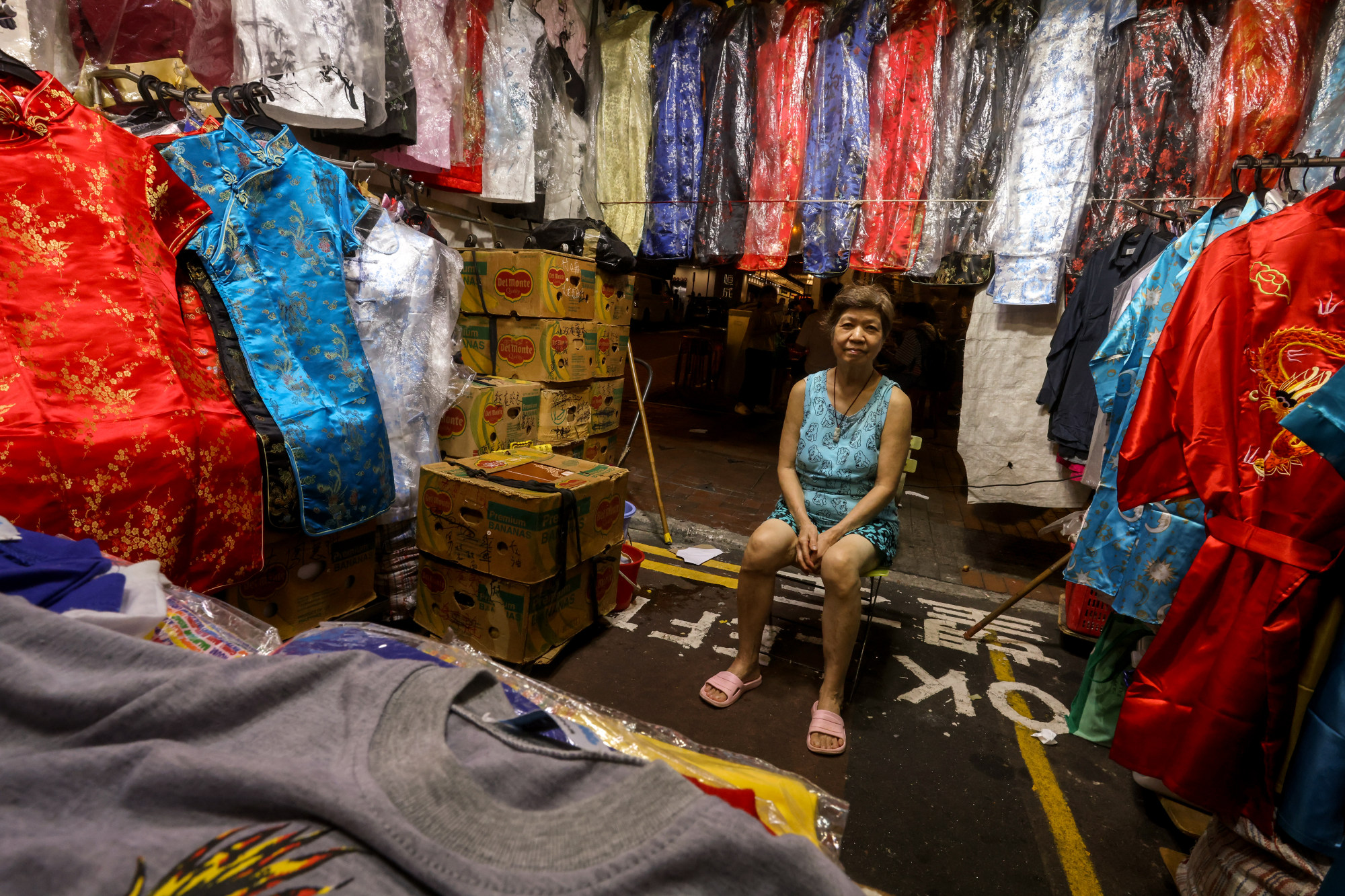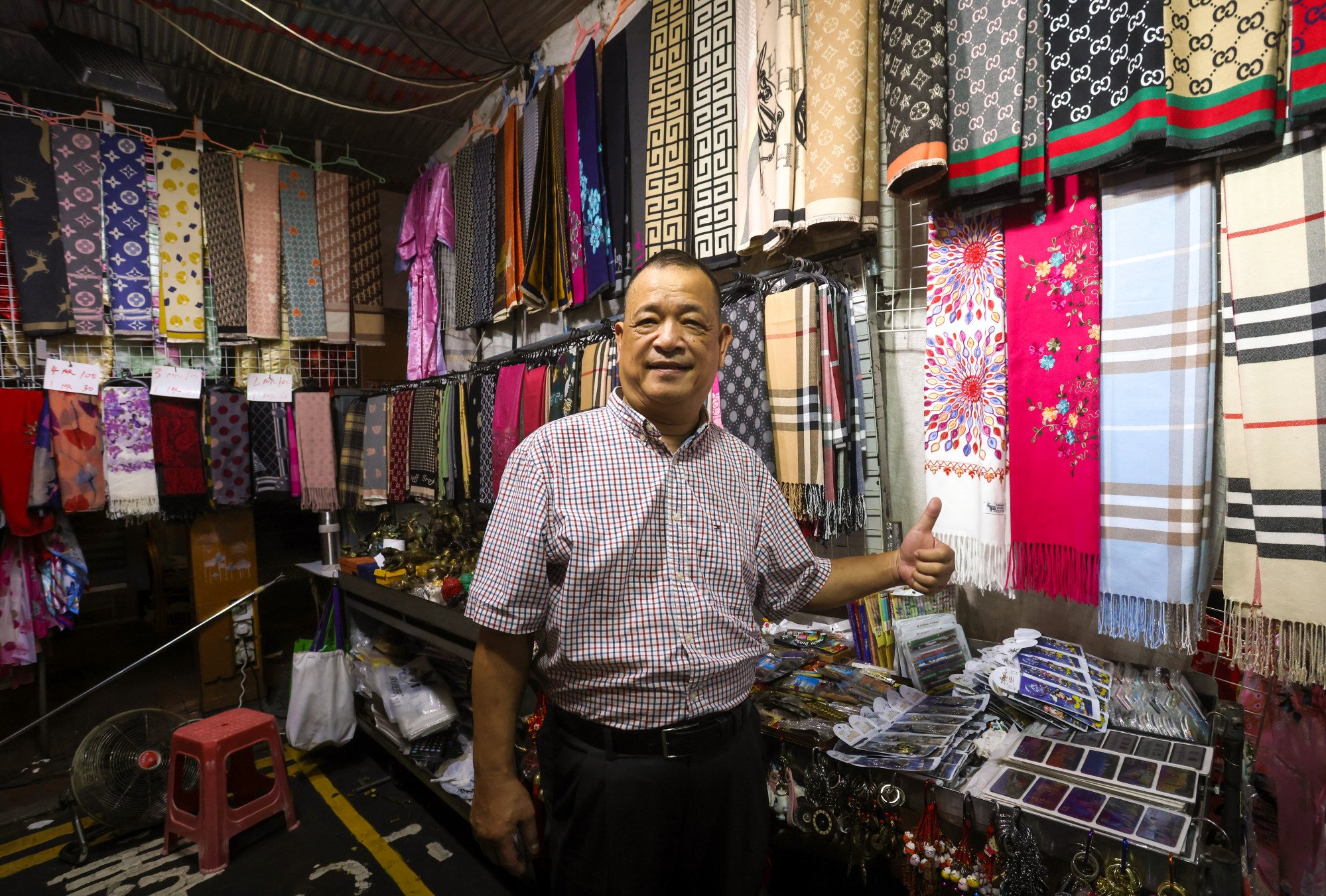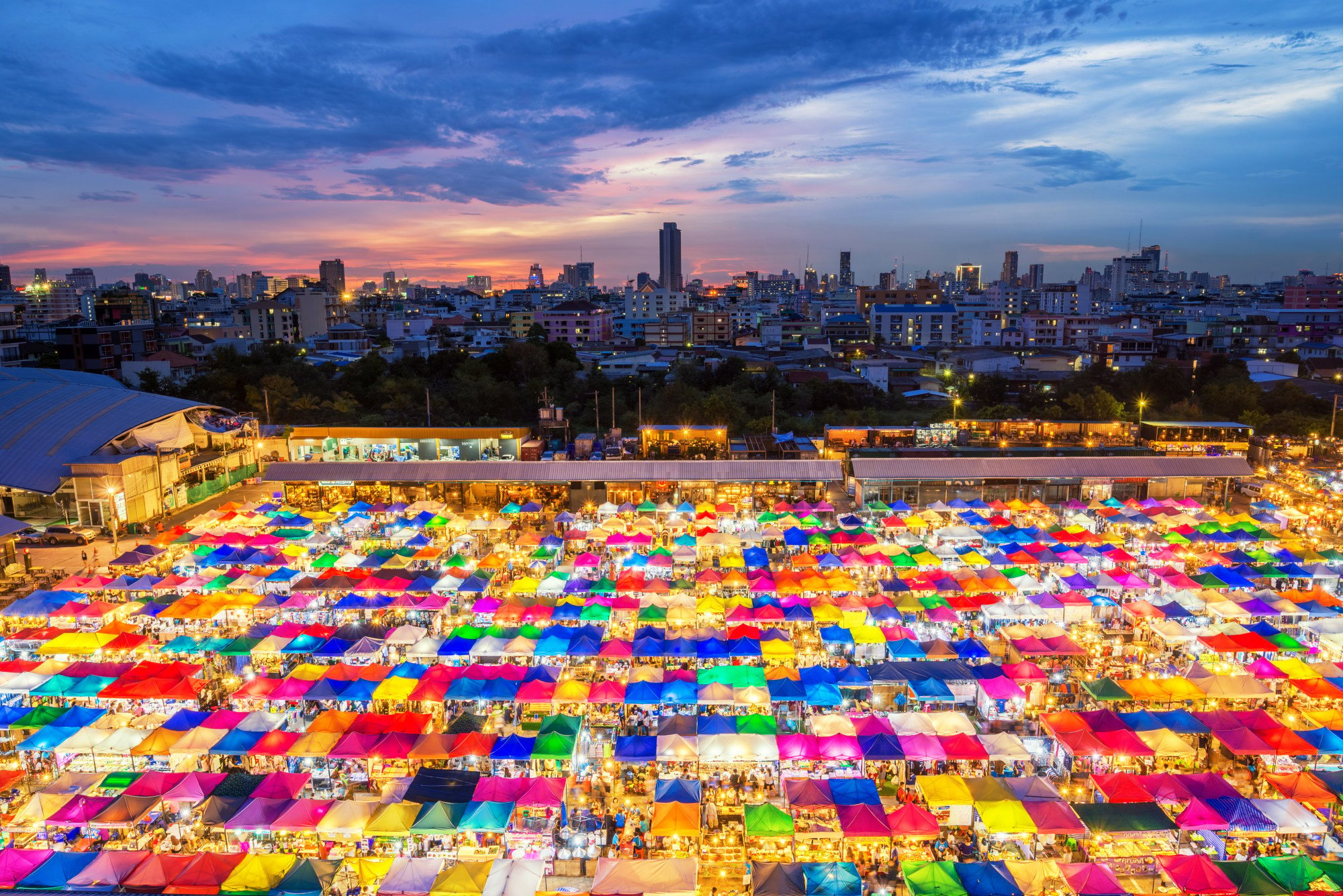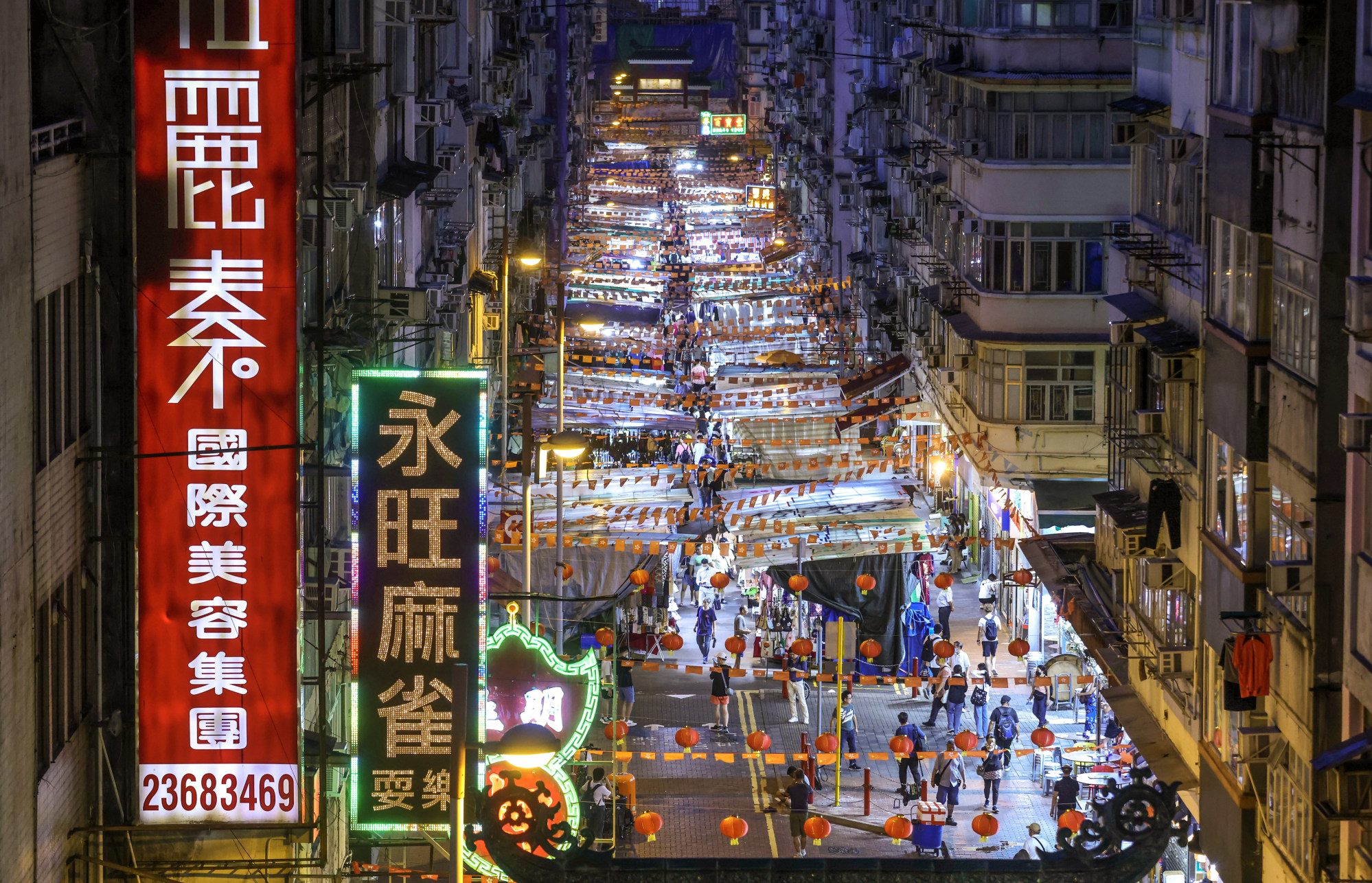It was just after 10pm on a weekday at Hong Kong’s well-known Temple Street Night Market, and clothes vendor Leung Siu-chun sighed as she counted her takings from selling qipao and tang suits at about HK$100 (US$13) apiece.
“I [made] slightly more than HK$200 ... today. Tourists come to browse and bargain but they don’t loosen their purse strings,” the 76-year-old said.
The street seemed lifeless and quiet, with many other stallholders gone for the day.
Do you have questions about the biggest topics and trends from around the world? Get the answers with SCMP Knowledge, our new platform of curated content with explainers, FAQs, analyses and infographics brought to you by our award-winning team.
“I’ve been running this stall for more than 40 years and business has never been this bad. On the worst days, I don’t even earn a cent,” Leung said.

In better times, Temple Street presented a mix of old and new and drew visitors who swarmed its numerous stalls selling clothes, souvenirs, jade, antiques, mobile phones and watches.
Traditional fortune-tellers beckoned and Cantonese opera singers performed late into the night, while dai pai dong food stalls dished out everything from chilli crab to steamed fish, prawn dumplings, deep-fried squid and roasted pigeon.
The subdued state of the street market reflects the situation across the city, alongside the trend of Hongkongers heading to mainland Chinese cities such as Shenzhen to dine and shop on weekends.
Hongkongers flock to Shenzhen where their dollar takes them further
There were about 6.8 million departures from the city in July, with 80 per cent crossing the border, against 3.6 million arrivals, most of them from the mainland.
‘Have waterfront stalls at Tsim Sha Tsui’
Financial Secretary Paul Chan Mo-po created a buzz recently with a plan for more night bazaars, conferences and exhibitions to revive the city’s lacklustre night economy.
He said the government would work with various sectors to organise night bazaars to attract high-value tourists and spur spending.
Chief Executive John Lee Ka-chiu on Sunday said he hoped night bazaars or evening activities would be an ongoing effort, rather than one-off in nature, and new elements could be added in stages.
He said his administration planned to roll out the first series of activities around the Mid-Autumn Festival on September 29 and during the National Day holidays on October 1 and 2 through the new year.
While some in Hong Kong welcomed the move and tossed up ideas from famous night markets elsewhere, others wondered if the bazaars could really spur spending and economic growth in the post Covid-19 era.
Raymond Chan Kam-wing, chairman of the Yaumatei Temple Street Association of Hawkers and Shop Operators, said the Temple Street market had been losing its appeal as stalls closed as early as 9pm and shoppers seemed unwilling to spend.

“In the past, the stalls would only close after midnight and food sellers would start closing at 2am,” he recalled. “But now, only a third of the 300 stalls open for business and they close very early. After 10pm, the street becomes very deserted and dull.”
He supported the idea of adding more night bazaars, saying they could revitalise the city’s night scene at a time when tourists were seeking “local experiences” and Hongkongers had changed their lifestyle, too.
“Since the pandemic, people tend to keep a tight rein on their spending because of the economic uncertainties. Nowadays, restaurants push diners to settle their bills as early as 9pm,” he said. “We need some fresh ideas to get people to go out and spend.”
He said Hong Kong could draw inspiration from Zhuhai’s Xiawan market and set up a waterfront bazaar of about 100 stalls that opened from after 9pm to 3am in Tsim Sha Tsui East.
Hong Kong to host night bazaars, organise conferences to spur economy: Paul Chan
The Xiawan market in the Guangdong city was transformed after scattered and disorderly itinerant vendors were brought together as a “nightlife zone” with orderly management, offering an array of local food.
“The government should issue temporary licences for market stalls and repackage the night markets in districts such as Sham Shui Po, Causeway Bay and Wan Chai with international appeal and fresh modes of operation,” Chan said.
“The night bazaar in Tsim Sha Tsui, for example, should focus on food and drinks with outdoor seating so patrons can enjoy the beautiful waterfront. After closing hours, the vendors should clear up the site.”
Hong Kong computer festival made into night bazaar but sales flat, say vendors
Chan said the authorities could add buzz and attract more people by having a dazzling light show by hundreds of synchronised drones, as well as more concerts in the nearby Hong Kong Coliseum.
“The government could also offer consumption vouchers to be used at night, and cheap cinema tickets for late-night screenings to entice people to go out,” he said. “Then people will be willing to dig deeper into their pockets.”
Michelin chefs at street stalls?
Tycoon Allan Zeman, chairman of the Lan Kwai Fong Group which runs the nightlife precinct in Central, said Hong Kong needed to spice up its unique local culture and aim for first-class night bazaars if it hoped to attract higher-spending visitors.
“It’s got to be first class,” he said. “If it’s a typical night bazaar which attracts low-end, low-spending tourists, this will be meaningless ... It’s really got to be something special and creative.”
Zeman said Hong Kong could have its own unique attraction like Taipei’s Shilin Night Market or Bangkok’s Chatuchak Market, and suggested drawing in Michelin-starred chefs to build its reputation and attract visitors.

“It’s fun and different if you have a Michelin-star chef in a market,” he said.
Taipei’s Shilin Night Market is more than a century old and a must on visitors’ lists, offering clothes, shoes, accessories, electronics and a wide spread of street food such as oyster omelettes, fried chicken fillets, pepper pork buns, deep fried fish balls and flame-grilled beef cubes.
Chatuchak has 15,000 stalls in 26 sections and is the world’s largest weekend market, drawing visitors looking for Thai food, clothes, second-hand merchandise, home decor, handicrafts, antiques and even plants. Tired shoppers can also get a soothing massage there.
The night is young? Call for longer Hong Kong mall hours, vouchers for late shoppers
Zeman suggested reviving Hong Kong’s dai pai dong open-air food stalls and cooked food centres to “create a culture, create a mood”.
“Bring them back. That’s the culture of Hong Kong, like milk tea,” he said. “We need to make it vibrant to make Hong Kong great again.”
Offering quick, cheap meals and a place to socialise, the dai pai dong – Cantonese for “big licensed stalls” – were usually tucked away in small alleyways, next to the city’s high-rises.

Despite being popular, with customers lining up for a seat, they are on the brink of extinction with only 25 left after the government stopped issuing new licences. There are 11 in Sham Shui Po, 10 in Central, three in Wan Chai and one in Tai O.
Zeman urged the authorities to ease up on the rules, and said residents near stalls that stayed open at night should accept the inconvenience.
“We have to change the regulations. The noise and all that, people will live with it, like in Lan Kwai Fong,” he said.
‘Bring back Gala Point’
Liberal Party lawmaker Peter Shiu Ka-fai said the government could consider introducing a night market like Sheung Wan Gala Point, one of Hong Kong’s most popular tourist attractions between the 1970s and 1980s.
Known as the “poor man’s nightclub”, it had activities such as singing, juggling, fortune-telling, food stalls and a flea market. The site was closed in 1992 because of redevelopment in the area, including the Shun Tak Centre.
“The government should identify suitable sites far away from residential areas for night bazaars so they won’t cause nuisance in the neighbourhood. The licensing procedures should be simple,” he said.
“The night bazaar should not only focus on food, but also a variety of other cultural and recreational products and activities such as arts and crafts, clothes and performances.”
For a more vibrant nightlife scene, he suggested having midnight films at special prices, night concerts, pet shows and magic performances.
But Simon Wong Kit-lung, chairman of the Quality Tourism Services Association and head of the LH Group which has 56 eateries, was not enthusiastic about having night bazaars and was concerned about their impact on restaurants.
“If these food stalls can get a licence at a low cost without rent while restaurants need to pay high rent, the stalls will make it harder for restaurants to survive,” he said.
“The idea of night bazaars doesn’t work for Hong Kong as we are suffering from insufficient customers as a whole, not just at night. We should focus on how to get people to go out and spend.”
Summer slump bites hard for Hong Kong restaurants as locals, tourists change habits
He felt the city should have more events and performances instead.
“The government can subsidise local arts groups to sing or dance at venues such as football fields or parks to attract people and spice up the city’s spending sentiment and economic activities,” he said.
“When people are willing to come out, they will look for other things such as dining and shopping. This is a way to revive the economy.”
Economist Simon Lee Siu-po, honorary fellow at Chinese University’s Asia-Pacific Institute of Business, also poured cold water on having more night bazaars, saying their returns would be limited.
“Night bazaars cannot generate many economic benefits, nor can they stimulate significant growth in gross domestic product,” he said.
Noting that more visitors from the mainland now came on day trips, he said: “Tourists won’t stay overnight just to go to night bazaars.
“As for locals, Shenzhen is more attractive because prices are much cheaper with an array of quality food and products. Hong Kong can’t really compete with Shenzhen now for nightlife.”
For Hong Kong night bazaars to be successful, he said, they needed to carve out a niche by featuring the city’s heritage and uniqueness with policy support.
“The night markets should offer something special and local which you can only find in Hong Kong so tourists and locals will be lured by word of mouth to visit,” he said.
More from South China Morning Post:
- Hong Kong to launch night bazaars, organise more conferences and exhibitions to drive economic recovery, finance chief Paul Chan says
- Hong Kong computer festival rebranded as night bazaar in bid to boost economy but vendors say business yet to get a lift
For the latest news from the South China Morning Post download our mobile app. Copyright 2023.





